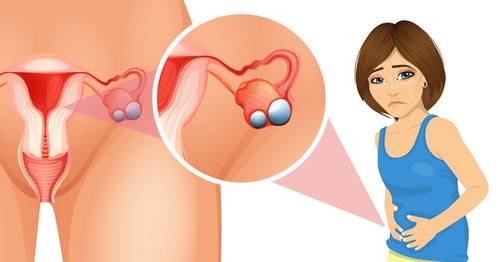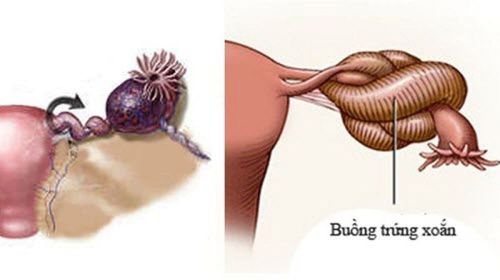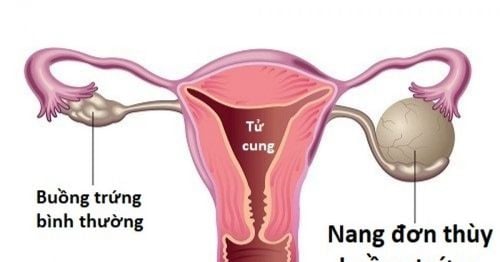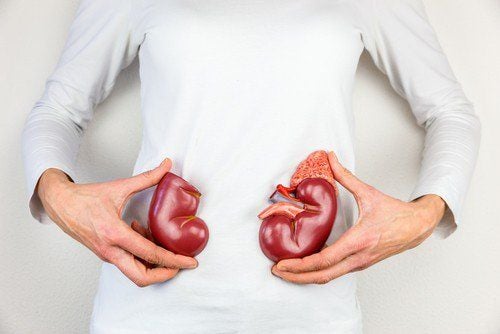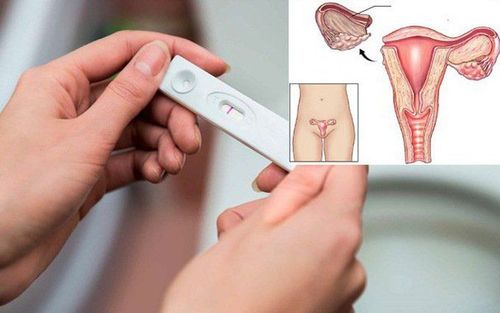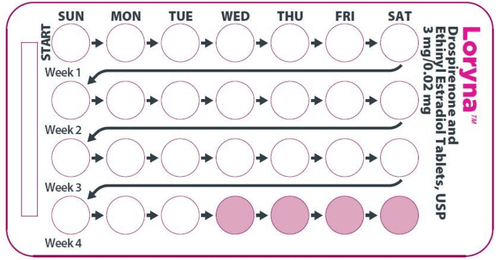This is an automatically translated article.
The article is professionally consulted by Master, Resident Doctor Nguyen Thi Tam - Clinician - Reproductive Support Center - Vinmec Times City International Hospital.Ovarian cyst is a very common gynecological disease in women. However, for women in the reproductive period, the effects of ovarian cysts on fertility and pregnancy will make many women worried.
1. What is an ovarian cyst?
Ovarian cysts usually do not cause clinical symptoms. Sometimes there is only pain in the lower abdomen, back pain or pain during menstruation. Not all ovarian cysts affect fertility. Classification of ovarian cysts:Functional tumor: According to the physiological cycle of the ovary, every month, on one side of the ovary, one follicle will be nourished and developed, released, and followed the fallopian tube. into the uterus for a chance to be fertilized and implanted. Accordingly, when the egg is released, the follicle will burst on its own. However, sometimes the follicle continues to grow and fills with fluid, forming a functional follicle. This cyst will disappear on its own after a few menstrual cycles, without affecting fertility. Physical ovarian cysts: dermoid cysts, water cysts, mucinous cysts, endometrioma... most of these cysts do not directly affect fertility, simply symptoms. of larger illnesses that can affect fertility. To diagnose ovarian cysts, ultrasound is the simplest method. In a small number of patients, when ultrasound does not provide sufficient information, magnetic resonance abdomino-pelvic imaging (MRI) is usually the next step.
2. Can ovarian cysts give birth?
Many women, when diagnosed with ovarian cysts, worry about whether ovarian cysts can give birth? However, the impact of ovarian cysts on a woman's general health in general and a woman's ability to get pregnant in particular depends on many factors. Specifically, the nature of the cyst, the size and progression of the cyst, and the age and baseline fertility of the woman.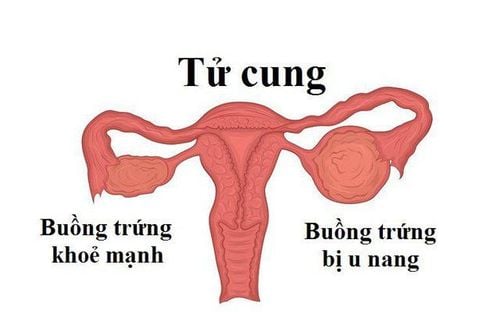
The majority of these cysts do not show any signs or symptoms of ovarian cysts. They usually go away without treatment after a few menstrual cycles. At the same time, functional cysts also do not cause infertility and the pregnancy is still as favorable as a normal pregnancy.
However, if the cysts still grow larger, they can rupture, bleed, and twist the ovary. The rate of ovarian torsion will increase 5 to 6 times during pregnancy. Therefore, a large cyst should be carefully monitored and examined.
Benign ovarian water cyst This cyst is a type of benign tumor in nature. They result from the growth of glands on the surface of the ovaries.
If it weren't for their large size as well as the possibility of ovarian cyst complications, water cysts do not affect fertility.
Ovarian dermoid cysts contain different types of tissue, ranging from nerve tissue, fatty tissue to hair, teeth, and bone instead of being liquid like a normal cyst. Ovarian cysts do not cause infertility.
Hemorrhagic cyst A hemorrhagic cyst is essentially a functional cyst with bleeding complications within the tumor. If the blood is self-absorbed without serious consequences and does not require special interventions, hemorrhagic cysts will have absolutely no effect on the ability to conceive and become pregnant.
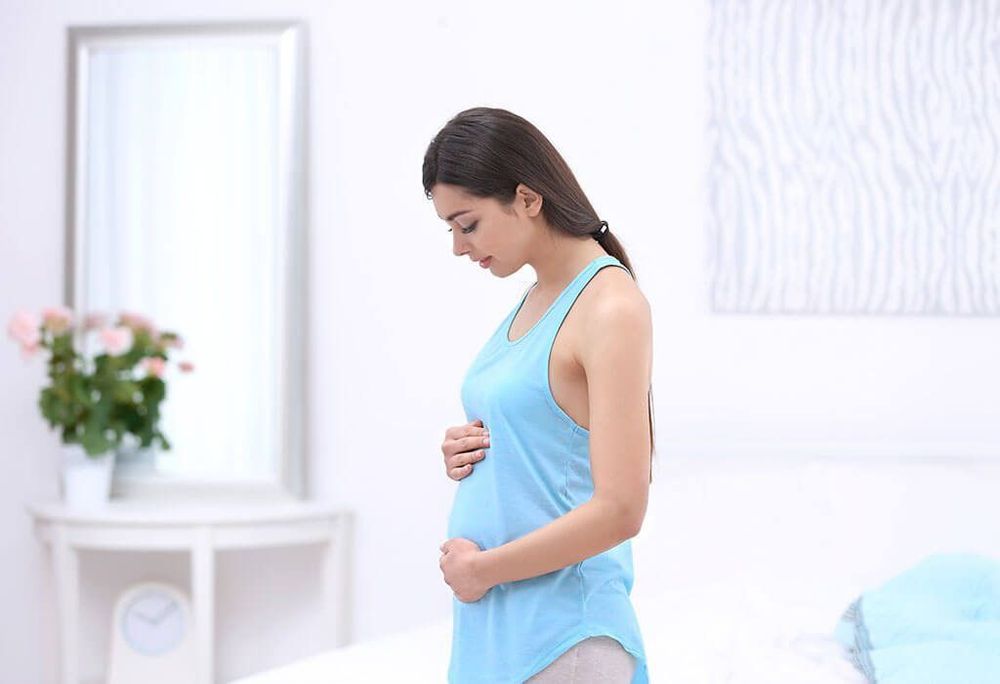
Endometriosis Endometrioma is a type of cyst that is endometrial tissue, which develops abnormally in the ovary. The endometrium is the mucous membrane lining the inner layer of the uterine wall, which is influenced by hormones to create the menstrual cycle. Because of this, endometrial cysts often cause chronic pain in the pelvic region. They constantly change size depending on the menstrual cycle and inside are filled with dark, reddish-brown blood.
Endometriosis tumors, when advanced in size, will affect fertility. Endometriosis can lead to blocked fallopian tubes causing infertility.
Furthermore, endometriosis can disturb the physiological function of a normal ovary, affecting ovarian reserve. In some cases, there are indications to remove the ovaries due to tumors, putting women at risk of infertility.
Polycystic Ovarian Syndrome (PCOS) is a syndrome caused by a hormone imbalance. Infertility is the most common symptom that prompts women with PCOS to seek medical advice. The main cause of infertility in women with PCOS is an ovulatory disorder that leads to reduced fertility.
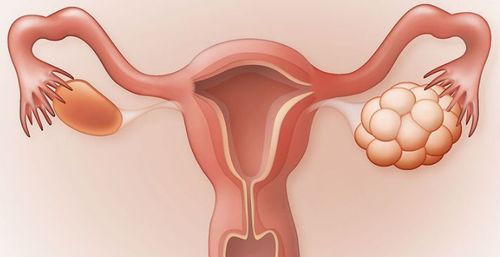
3. Risk of pregnancy with ovarian cysts
While most ovarian cysts are asymptomatic, some ovarian cysts that form during pregnancy or develop during pregnancy can still cause symptoms such as abdominal pain and an enlarged abdomen. faster than gestational age or abnormally high intra-abdominal pressure with flatulence, delayed digestion, poor appetite.Because the rate of fetal growth is very fast, especially in the second trimester, ovarian cysts, especially those that tend to grow in size during pregnancy, can hardly be left untreated. to the fetus. The effects of ovarian cysts on the fetus have been reported to cause miscarriage, premature birth.
Conversely, pregnancy can also have an effect on ovarian cysts, causing complications at any stage of pregnancy, including postpartum. Especially in the first days after birth, the state of the abdominal wall is soft and the abdomen is empty, so it is easy to lead to complications of torsion.
Therefore, if an ovarian cyst is assessed, even though it is a functional tumor, it tends to progress during pregnancy and has a risk of affecting the development of the fetus, although it has not caused any symptoms, it should still be considered. are considered to actively intervene according to the program, ensuring a safe pregnancy and labor for mother and child.
In short, can ovarian cysts get pregnant, have children... is a concern of many women. Despite the benign nature and fairly common frequency, women should still visit and monitor the right specialist, especially when planning pregnancy and childbirth, and proactively intervene when indicated to protect their health. reproductive health for herself and the development of the fetus.
In order to help customers detect and treat other gynecological diseases early, Vinmec International Hospital has a basic gynecological examination and screening package, helping customers detect early inflammatory diseases Easy, inexpensive treatment. Screening detects gynecological cancer (cervical cancer) early even when there are no symptoms.
Basic gynecological examination and screening package for female customers, has no age limit and may have the following symptoms:
Abnormal vaginal bleeding Having menstrual problems: irregular menstrual cycle, irregular menstrual cycle Irregular vaginal discharge (smell, different color) Vaginal pain and itching Female clients have several risk factors such as poor personal hygiene, Unsafe sex, abortion,... Female customers have other symptoms such as: Abnormal vaginal discharge, itching, pain in the private area, abnormal vaginal bleeding.
Please dial HOTLINE for more information or register for an appointment HERE. Download MyVinmec app to make appointments faster and to manage your bookings easily.





